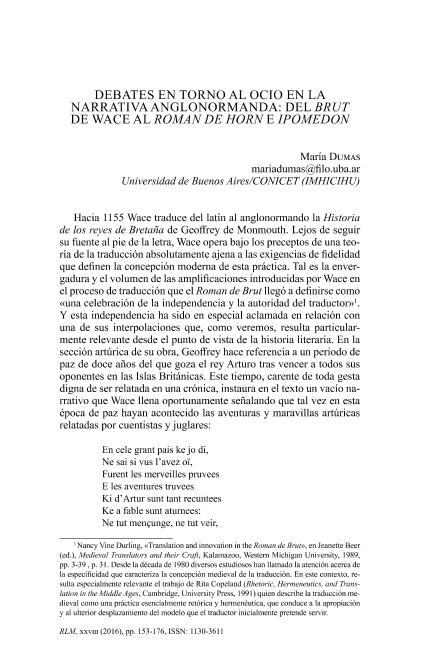Mostrar el registro sencillo del ítem
dc.contributor.author
Dumas, María

dc.date.available
2018-05-03T20:43:17Z
dc.date.issued
2016-12
dc.identifier.citation
Dumas, María; Debates en torno al ocio en la narrativa anglonormanda: del Brut de Wace al Roman de Horn e Ipomedon; Universidad de Alcalá; Revista de Literatura Medieval; XXVIII; 12-2016; 153-176
dc.identifier.issn
1130-3611
dc.identifier.uri
http://hdl.handle.net/11336/44068
dc.description.abstract
El trabajo analiza la recepción del problema planteado por el ocio, la recreantise, en la narrativa caballeresca de la Inglaterra anglonormanda. Esta cuestión, introducida por Wace en el Brut, fue abordada de manera célebre por Chrétien de Troyes en su primer roman, Erec et Enide. Sin embargo, como se desprende de la lectura del Roman de Horn de Thomas y de Ipomedon de Hue de Rotelande, en el ámbito insular este debate también goza de gran vitalidad, aunque recibirá un tratamiento diferente. La representación de un héroe ocioso lleva tanto a Thomas como a Hue a problematizar, por distintas vías, las convenciones narrativas propuestas por el roman en tanto género. La resistencia manifestada por ambos autores hacia este modelo genérico será determinante en el desarrollo ulterior del género, tanto en dialecto anglonormando como en inglés medio, y constituye un testimonio de gran valor sobre las peculiaridades de la recepción del roman en la Inglaterra del siglo XII.
dc.description.abstract
The aim of this article is to analyze how the problem of idleness, i.e. recreantise, is addressed in Anglo-Norman chivalric literature. This question, introduced by Wace in his Brut, was notably handled by Chré- tien de Troyes in his first romance, Erec et Enide. However, as it becomes evident from Thomas’s Roman de Horn and Hue de Rotelande’s Ipomedon, this discussion was also quite lively in the insular context. Representing an idle hero leads both Thomas and Hue to challenge, in different ways, the narrative conventions of the romance genre. The resistance evinced by the two authors towards this generic model would be highly influential on the later development of the genre in England, both in Anglo-Norman and Middle English, and affords a valuable testimony to the peculiarities of the reception of romance in twelfth-century England.
dc.format
application/pdf
dc.language.iso
spa
dc.publisher
Universidad de Alcalá
dc.rights
info:eu-repo/semantics/openAccess
dc.rights.uri
https://creativecommons.org/licenses/by-nc-sa/2.5/ar/
dc.subject
Roman Anglonormando
dc.subject
Ocio
dc.subject
Horn
dc.subject
Ipomedon
dc.subject.classification
Estudios Generales del Lenguaje

dc.subject.classification
Lengua y Literatura

dc.subject.classification
HUMANIDADES

dc.title
Debates en torno al ocio en la narrativa anglonormanda: del Brut de Wace al Roman de Horn e Ipomedon
dc.title
Discussing idleness in anglo-norman narrative: from Wace’s Brut to the Roman de Horn and Ipomedon
dc.type
info:eu-repo/semantics/article
dc.type
info:ar-repo/semantics/artículo
dc.type
info:eu-repo/semantics/publishedVersion
dc.date.updated
2018-04-27T13:26:11Z
dc.journal.volume
XXVIII
dc.journal.pagination
153-176
dc.journal.pais
España

dc.journal.ciudad
Alcalá de Henares
dc.description.fil
Fil: Dumas, María. Consejo Nacional de Investigaciones Científicas y Técnicas. Oficina de Coordinación Administrativa Saavedra 15. Instituto Multidisciplinario de Historia y Ciencias Humanas; Argentina. Universidad de Buenos Aires. Facultad de Filosofía y Letras. Departamento de Letras; Argentina
dc.journal.title
Revista de Literatura Medieval
dc.relation.alternativeid
info:eu-repo/semantics/altIdentifier/url/https://recyt.fecyt.es/index.php/RLM/article/view/62052
Archivos asociados
